The insights and strategies in the K-Streaming industry aimed at strengthening global competitiveness
As the Korean market is rapidly reorganizing around Streaming service, the Korea government has taken measures to strengthen the global competitiveness of the local streaming service and industry. The intention is to improve the system so that it can compete with global streaming service such as Netflix and Disney+.
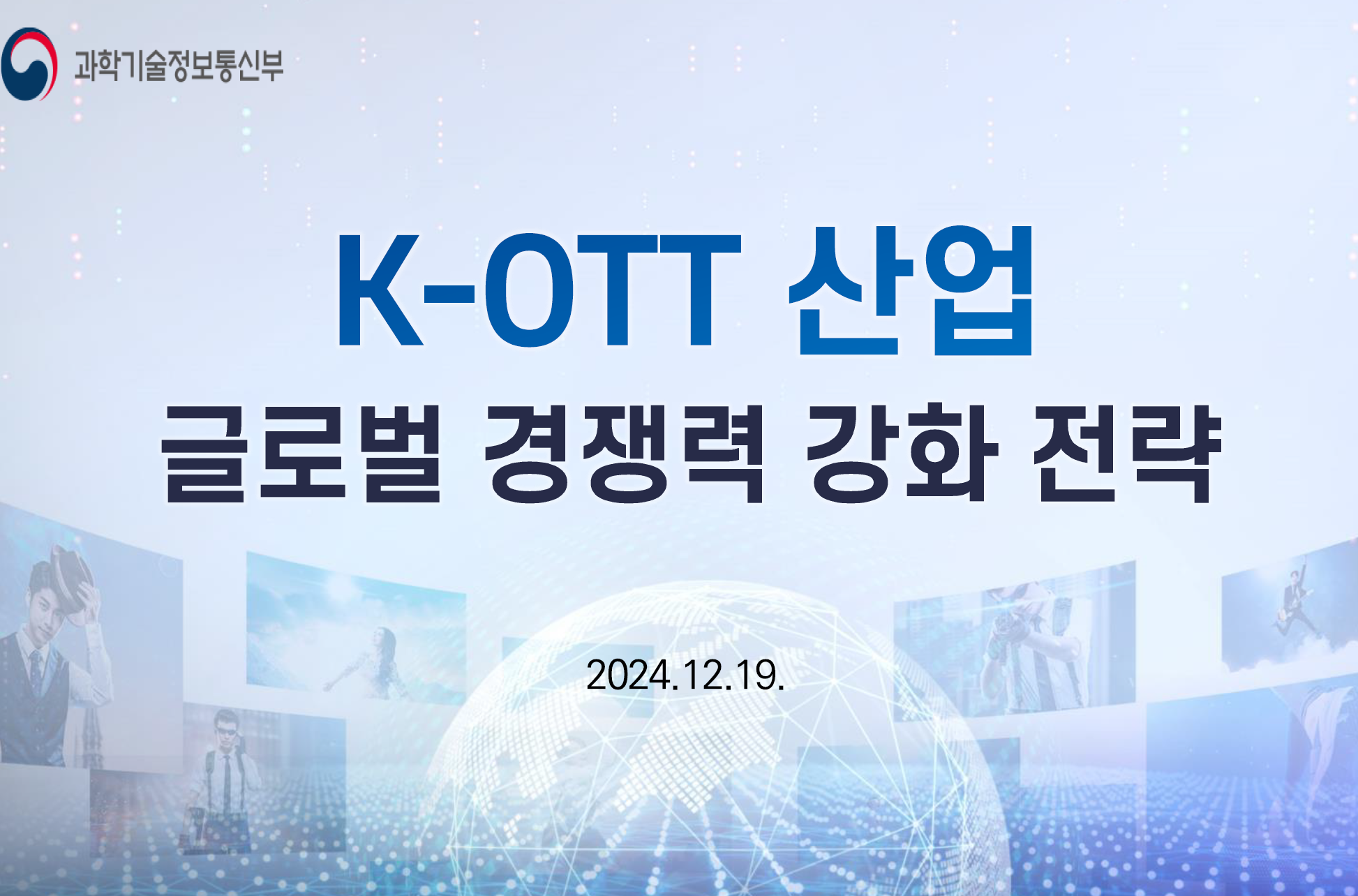
K-OTT Industry Strategy: Global Competitiveness Enhancement Plan
The Ministry of Science and ICT (MSIT) has developed a comprehensive strategy aimed at strengthening the global competitiveness of Korea's OTT (Over-The-Top) industry. This strategic plan, set to be implemented by December 19, 2024, represents a significant initiative to enhance Korea's position in the global streaming market.
The plan's title, displayed prominently in the image, emphasizes the focus on developing global competitiveness for the K-OTT sector. The visual elements in the background, including a digital globe and interconnected network patterns, symbolize the international reach and technological advancement this initiative aims to achieve.
To this end, Korea government plans to use artificial intelligence (AI) technology in all stages from content planning and production to distribution to overcome limitations in terms of capital, and to actively utilize FAST (Free Ad supported Streaming TV) on smart TV from Samsung Electronics and LG Electronics as well as local streaming service such as Tving to globalize K-content.
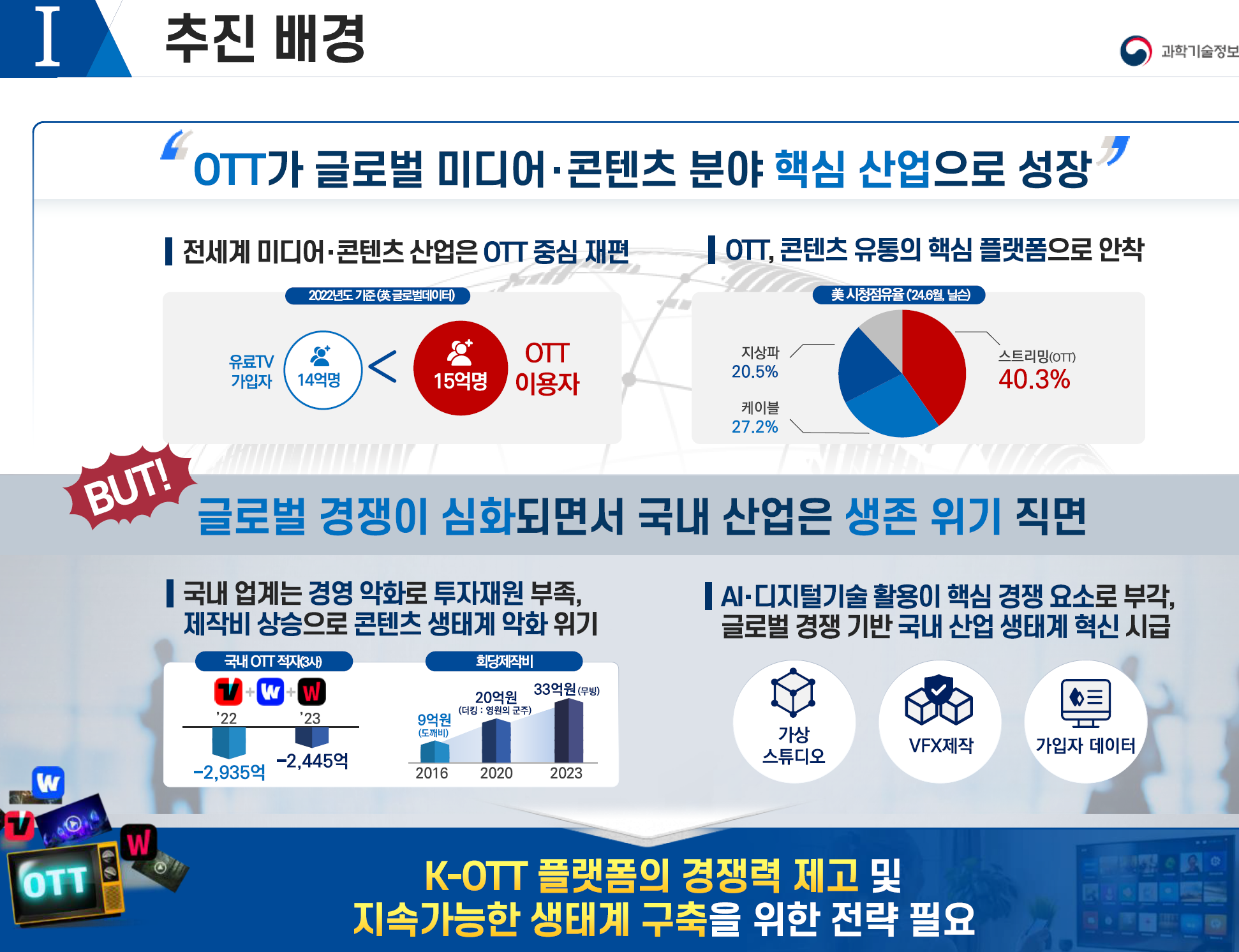
Title: "OTT Growing as Core Industry in Global Media/Content Market"
Global Media & Content Industry Trends
- Global OTT users (15 billion) exceed traditional TV viewers (14 billion) as of 2022
- Streaming (OTT) dominates market share at 40.3%, followed by Cable (27.2%) and Terrestrial TV (20.5%)
BUT! Domestic Industry Faces Survival Crisis Amid Global Competition
Financial Challenges
- Domestic OTT companies showing operating losses:
- 2022: -293.5 billion won
- 2023: -244.5 billion won
- Production costs increased from 9 trillion won (2016) to 20 trillion (2020), expected to reach 33 trillion won (2023)
Innovation Opportunities
Core elements for survival and growth:
- Smart Studio Development
- VFX Production Enhancement
- Creator Data Utilization
Strategic Direction
K-OTT platforms need to enhance competitiveness and build a sustainable ecosystem for continued growth.
On the 19th Dec, 2024, the Ministry of Science and ICT announced the 'Strategy for Strengthening Global Competitiveness of the K-OTT Industry' outlining the same.
Through this, the ministry plans to expand the number of monthly users of OTT-FAST in Korea, which stood at 32 million as of last year, to 100 million by 2027.
"We will improve access to K-content by leveraging the 600 million Samsung and LG smart TVs in the world," said an official from the Ministry of Science and ICT. "In this process, AI technology can facilitate the globalization of domestic content."
For example, using AI technology to support dubbing of domestic content into the language of the country can help expand the market faster.
The ministry said it will support the production of 'K-FAST original content' and increase viewers by operating shopping services linked to it or making customized recommendations for local OTT.
It will also support the introduction of intelligent viewing services such as AI-based customized K-channel and OTT recommendations by inserting QR codes into shopping services linked to domestic content on these channels.
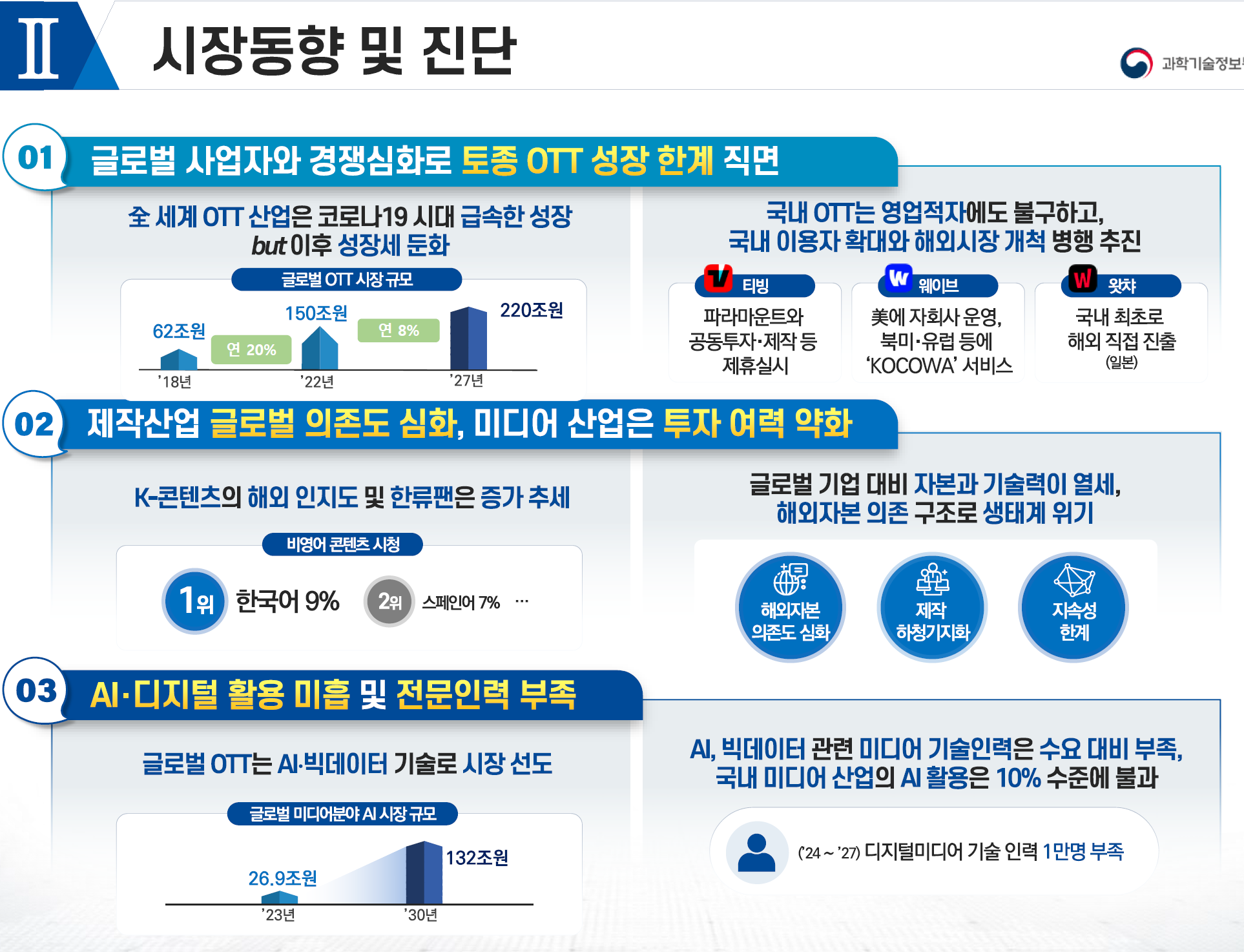
Market Status and Progress
01. Dominating OTT Market Through Global Business and Policy Cooperation
The global OTT industry showed rapid growth during COVID-19 but growth has since slowed:
- Global OTT Market Size:
- 2018: 62.3 trillion won
- 2022: 150 trillion won (20% YoY)
- 2027: 220 trillion won (8% YoY)
Domestic OTT platforms are expanding both locally and internationally:
- Tving: Partnership with Paramount and joint investment with retailers
- Wavve: Operating 'KOCOWA' service in US for K-content like variety shows and dramas
- Watcha: First Korean platform to expand overseas (Japan)
02. Global Dependency Deepening in Content Industry, Media Industry Investment Weakening
K-content's overseas recognition and fandom continues to grow:
- Korean content ranks #1 with 9% market share in non-English content
- Spanish content follows at 7%
Global companies face challenges with:
- Weakening overseas dependency
- Declining investment capacity
- Complex business structure
03. AI/Digital Implementation and Professional Workforce Development
Global OTT market leading with AI and big data technology:
- Digital media market scale:
- 2023: 26.9 trillion won
- 2030: 132 trillion won
AI development status:
- Major companies investing heavily in AI and big data capabilities
- Domestic media industry AI utilization remains at 10% level
- Plan to nurture 10,000 digital media professionals (2024-2027)
In addition, the government will support local streaming service companies to create short-form content using AI production and transformation technology to increase viewers.
This will improve the AI utilization rate in the broadcasting and OTT industry, which was at the 10% level last year, to 50% by 2027.
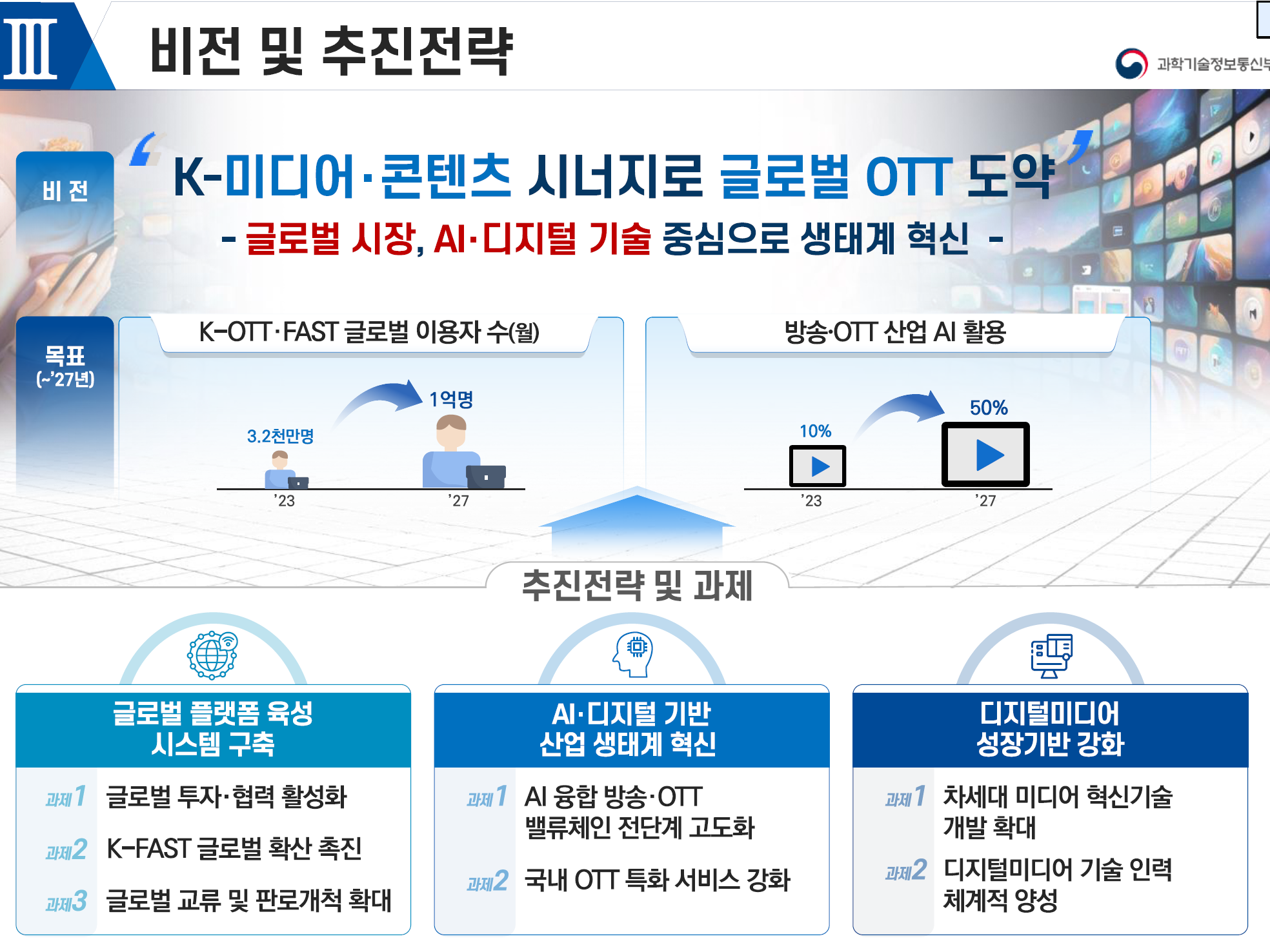
Vision and Implementation Strategy
K-Media and Content Synergy for Global OTT Dominance
- Global Market Transformation through AI and Digital Technology Innovation -
Key Statistics
K-OTT/FAST Global Users (Monthly):
- 2023: 3.2 million users
- 2027 Target: 1 billion users
Broadcasting-OTT Industry AI Adoption:
- 2023: 10%
- 2027 Target: 50%
Strategic Initiatives and Tasks
Global Platform Enhancement
- Promote global investment and cooperation
- Accelerate K-FAST global expansion
- Expand global education and sales network
AI/Digital Foundation
- Optimize AI-integrated broadcasting and OTT value chain
- Strengthen domestic OTT specialized services
Digital Media Development
- Expand next-generation media innovation technology development
- Systematically nurture digital media technology talent
"In order to reduce the time and cost of broadcast video production and secure AI video technology, we will build 3 million hours of broadcast video accumulated over the past 70 years as AI utilization data," said an official from the Ministry of Science and ICT.
"We plan to expand support for broadcast video production that combines AI and digital technologies such as special visual effects (VFX), digital humans, and automatic editing through collaboration between broadcasters and ICT companies."
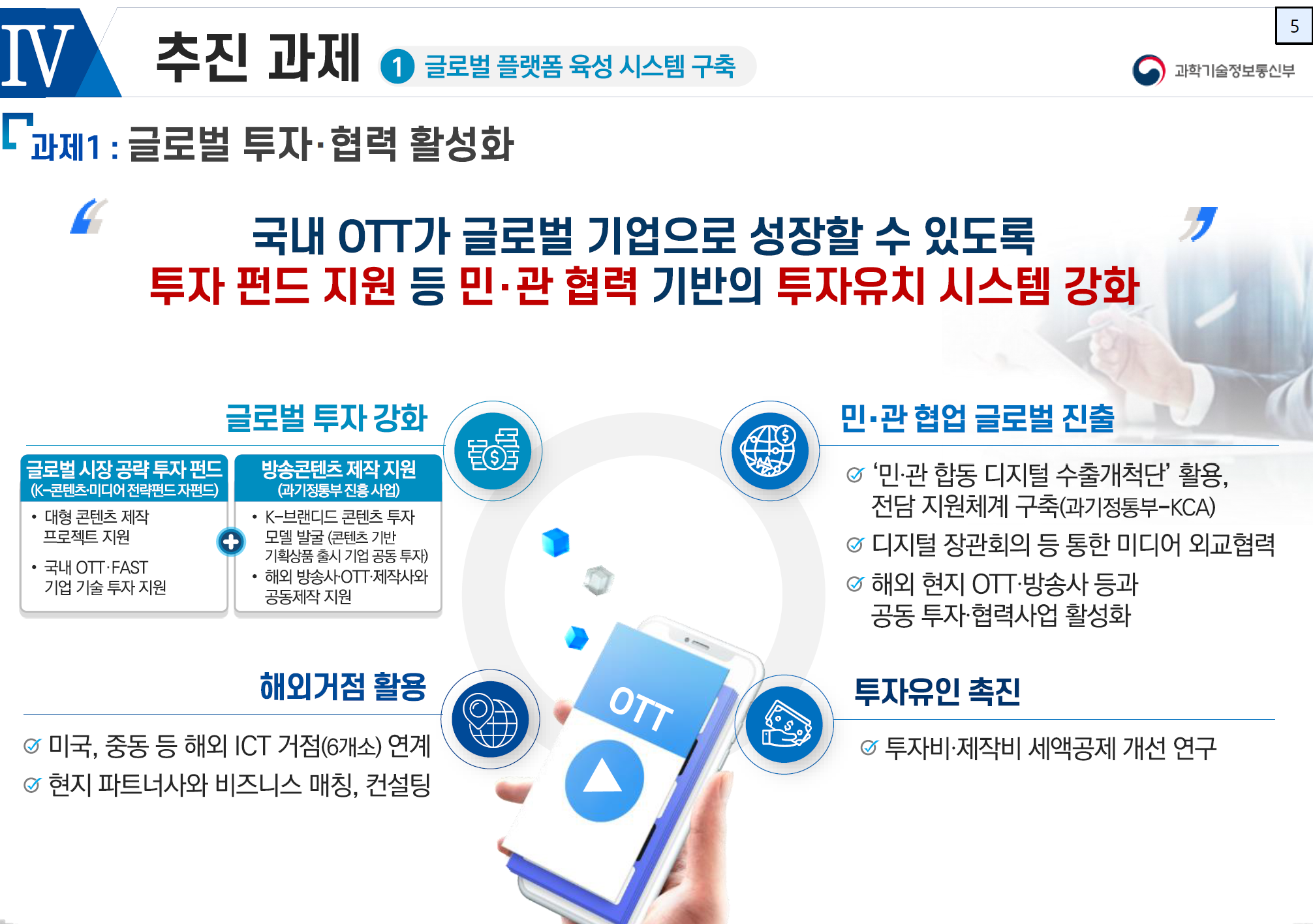
Task 1: Global Investment and Cooperation Activation System for Platform Content
Strengthening Support for Domestic OTT to Grow as Global Companies
Reinforcement of investment attraction system through public-private cooperation such as investment fund support
Global Investment Enhancement
- Support for global content creation through K-content media investment fund
- Support for domestic OTT-FAST company investment
- Support for broadcasting content production (government support project)
- Support for overseas OTT production business
Overseas Market Development
- Connection with 6 ICT markets including US and China
- Business matching and consulting with local partners
Public-Private Global Collaboration
- Expansion of 'Public-Private Digital Export Support Platform'
- Support system establishment (Ministry of Science and ICT - KCA)
- Media exchange cooperation through Digital Trade Council
- Activation of joint investment projects with foreign current OTT/broadcasters
Investment Attraction Enhancement
- Research on development of new investment/tax benefit models
In terms of capital and manpower, the government has decided to fully support the virtuous cycle of domestic content.
It will utilize the K-Content and Media Strategy Fund, a KRW 1 trillion fund, to create content that targets the global market and create and support self-funds for technology investment by local streaming-FAST companies. The government also announced that it will train 11,000 people in the digital media sector.
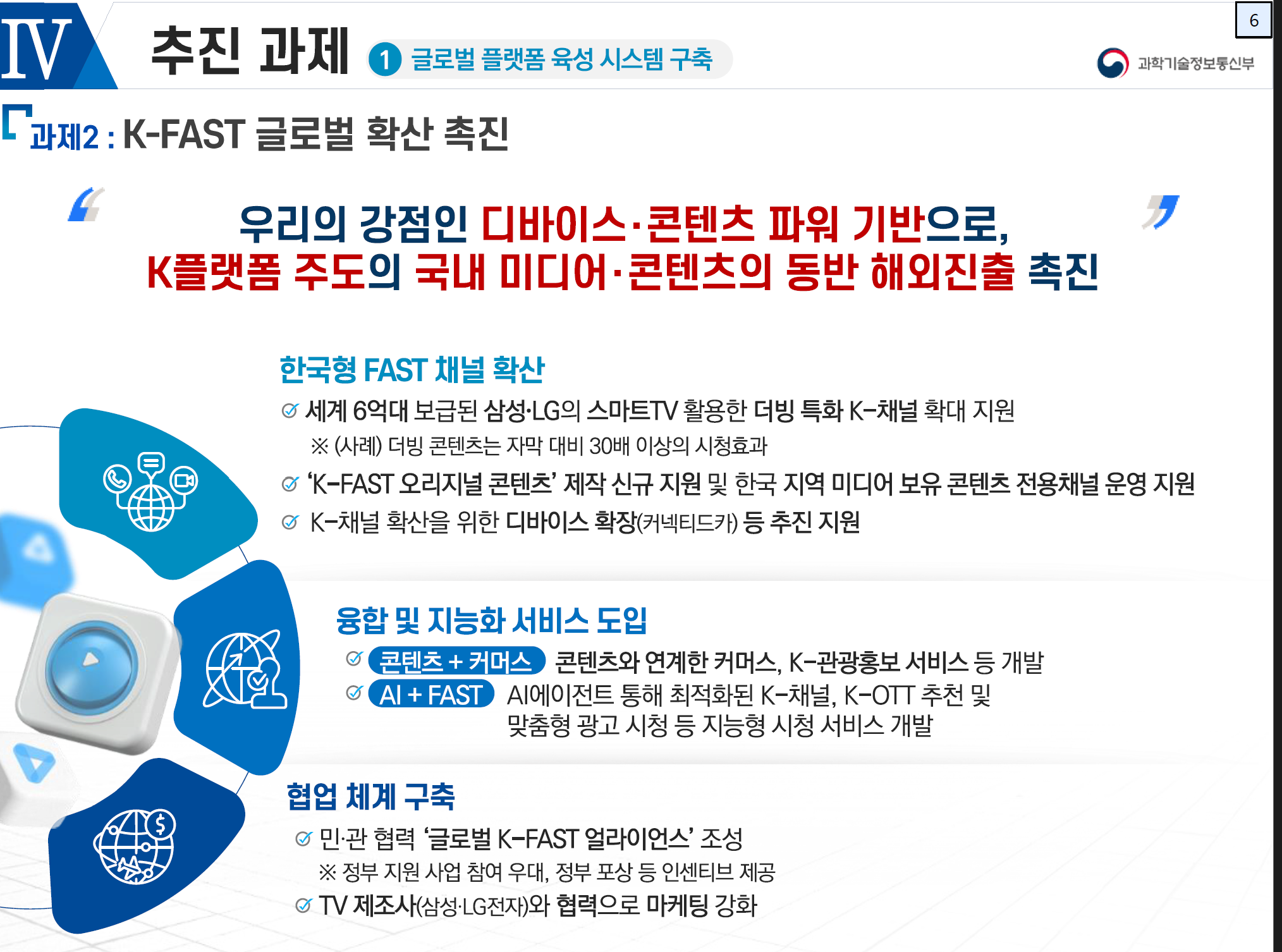
K-FAST Global Expansion Initiative
Building on our strengths in device and content power, we aim to promote K-platform-led overseas expansion of domestic media and content.
Korean-style FAST Channel Expansion
- Support K-channel expansion utilizing Samsung-LG Smart TVs deployed in 60+ million households globally
- Current Disney content shows over 30% viewing share
- Support for 'K-FAST Original Content' production and Korean regional media/content channel operation
- Support for device expansion (connected car, etc.) for K-channel growth
Convergence and Smart Service Domain
- Develop services combining content with commerce, K-tourism information integrated with commerce
- Create intelligent streaming services through AI + FAST integration, including K-channel, K-OTT support and targeted advertising systems
Cooperation Framework Construction
- Form 'Global K-FAST Alliance' through industry collaboration
- Government support projects participation, policy promotion and incentive provision
- Strengthen marketing through cooperation with TV manufacturers (Samsung-LG Electronics)
The government's support for indigenous OTTs comes amid fears that the Korean content industry could be turned into a global subcontracting base as foreign OTTs such as Netflix cannibalize the market. According to the Korea Communications Commission, the operating losses of the three companies, Tving, Wavve, and Whatcha, totaled 24.32 billion won last year. Coupang also does not disclose separate operating results for Coupang Play, but it is believed to be losing money.
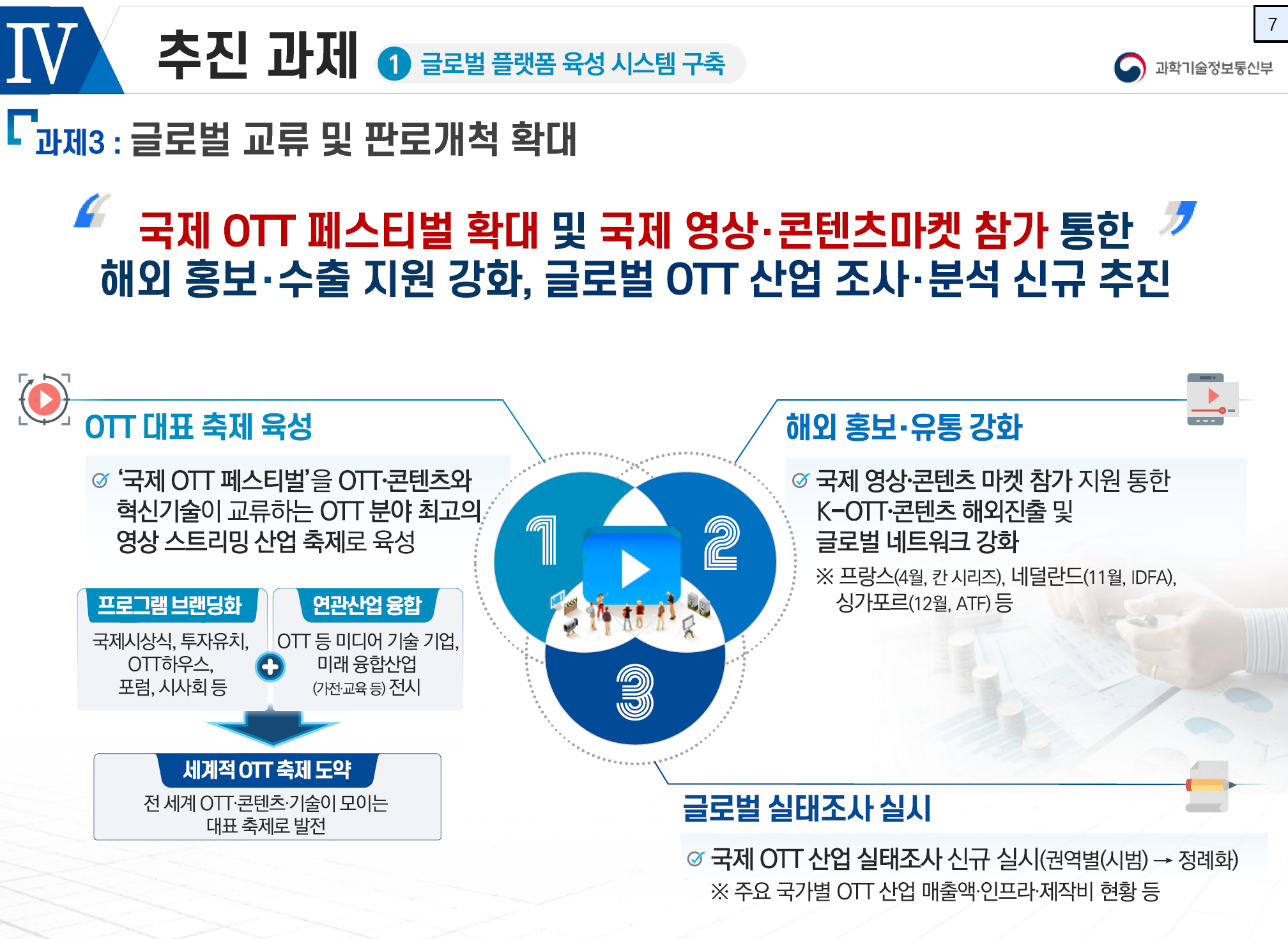
Global OTT and Distribution Network Expansion
OTT Festival Development
The initiative aims to foster the international OTT festival as a premier streaming industry event where global OTT platforms and content technologies converge. This involves:
- Program diversification through national exhibitions, investment fairs, OTT showcases, forums, and side events
- Industry collaboration with OTT platforms, media technology companies, and entertainment businesses
- Evolution into a world-class OTT festival platform
Global Promotion and Distribution Enhancement
- Support for K-OTT content international exports and strengthening global network presence
- Implementation in key markets including France (April), Netherlands (November, IDFA), Singapore (December, ATF)
Global Market Analysis
- Conducting comprehensive international OTT industry status surveys (transitioning from periodic to regular monitoring)
- Analysis of major countries' OTT industry output and infrastructure costs
The initiative integrates these three core components to expand international OTT festivals while strengthening overseas promotion and distribution channels for Korean content in the global streaming market.
Ryu Je-myeong, head of the Network Policy Division at the Ministry of Science and ICT, said, "We hope that this OTT strategy will provide momentum for global expansion."
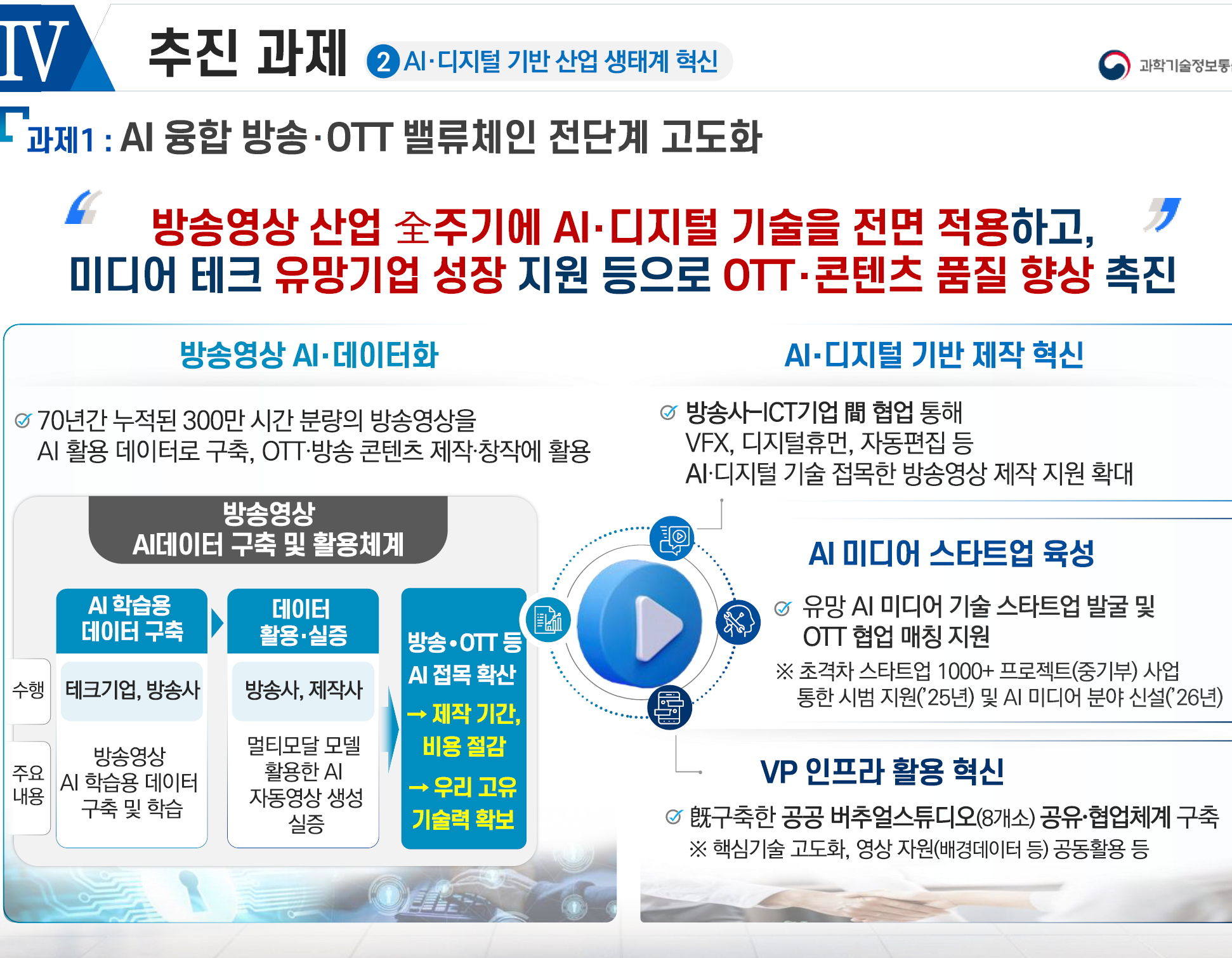
AI Integration for Broadcasting and OTT Value Chain Enhancement
The initiative aims to comprehensively apply AI and digital technologies to the broadcasting industry while fostering OTT and content quality through support for promising media tech companies.
AI-Powered Broadcasting Data Strategy
- Construction and utilization of AI training data from 3 million hours of broadcast content accumulated over 70 years
- Implementation of AI solutions for OTT and broadcasting content production/distribution
AI-Digital Infrastructure Enhancement
- Support for broadcasting content production incorporating AI-digital technologies like VFX, digital humans, and automated editing
- Collaboration between broadcasters and ICT companies to strengthen AI-digital capabilities
AI Media Startup Ecosystem
- Development of promising AI media technology startups and support for OTT partnership opportunities
- Support for over 1,000 early-stage projects and AI media innovation sectors
- Focus on nurturing new AI media industries
VP Infrastructure Expansion
- Establishment of collaborative framework for 8 existing public virtual studios
- Shared use of core technologies including real-time graphics and video resource management
Take away
1. 📊 Key Growth Metrics in the K-OTT Industry
. The K-OTT industry is experiencing an annual growth rate of 8% .
. A separate growth metric indicates an even higher annual rate of 20% .
. These growth statistics provide a foundational understanding of the K-OTT sector's current performance.
. Insights into these metrics are vital for exploring the industry's global competitiveness .
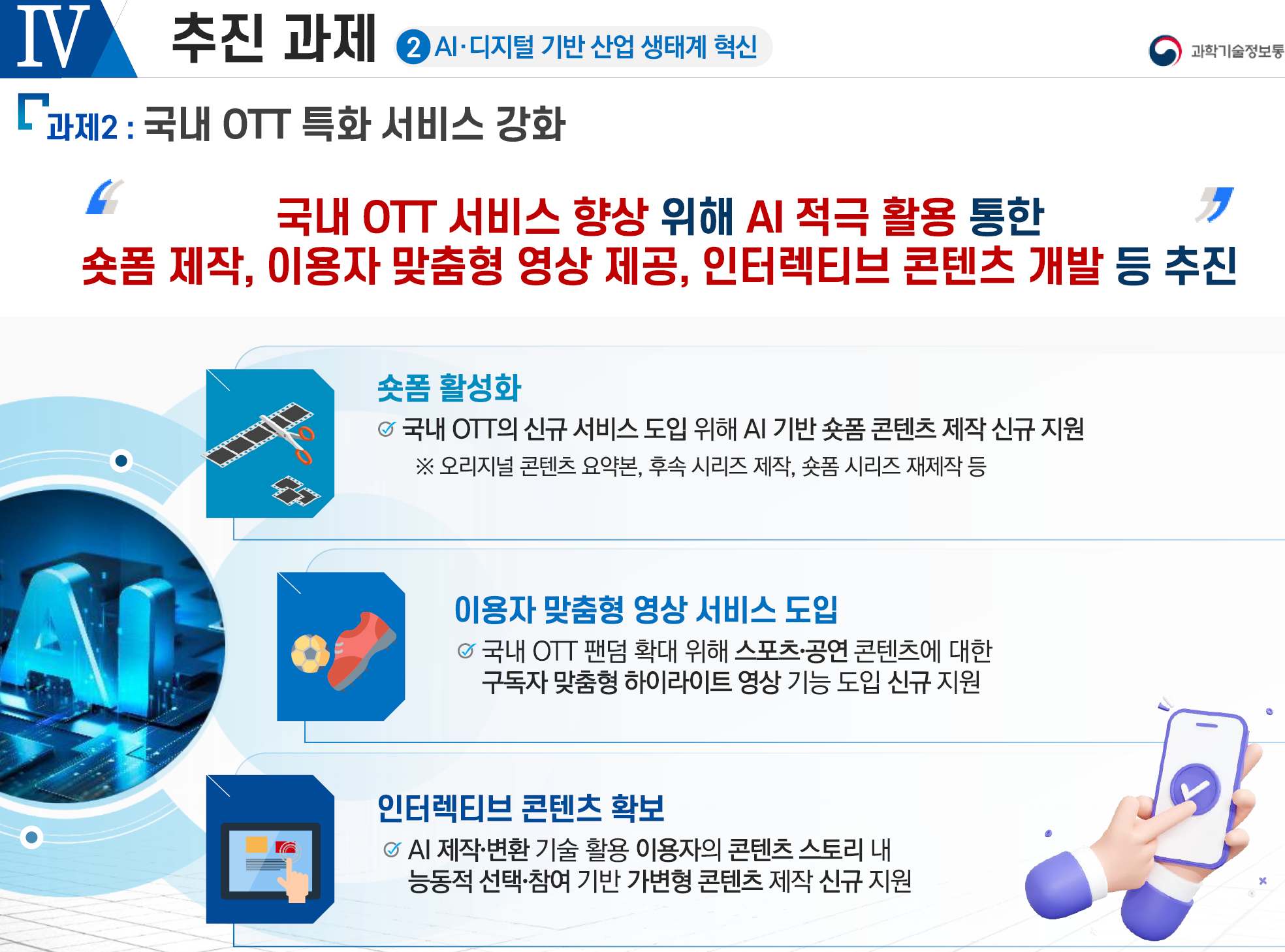
Enhancing Domestic OTT Services Through AI Integration
The initiative focuses on strengthening domestic OTT services through AI-driven solutions across three key areas:
Content Enhancement
- Support for creating new AI-based content formats for domestic OTT services
- Development of original content, sequel series production, and content series development
- Implementation of AI tools for streamlined content creation workflows
Personalized User Experience
- Introduction of AI-powered customized highlight video features for sports and performance content
- Support for developing viewer-tailored content recommendation systems
- Enhancement of user engagement through smart content delivery
Interactive Content Development
- Integration of AI-powered content transformation tools to enable dynamic user interactions
- Development of variable content formats based on user engagement patterns
- Support for creating AI-driven interactive storytelling experiences within content platforms
2. 📊 Strategic Emphasis in K-OTT Industry
. The document focuses on strategies to strengthen the global competitiveness of the K-OTT industry.
. Insights are provided on the rapid growth rates, such as 8% and 20%, to assess industry dynamics.
. Understanding these strategies is crucial for stakeholders navigating market complexities effectively.
. Emphasizes the importance of collaboration and innovation for sustainability in a rapidly changing landscape .
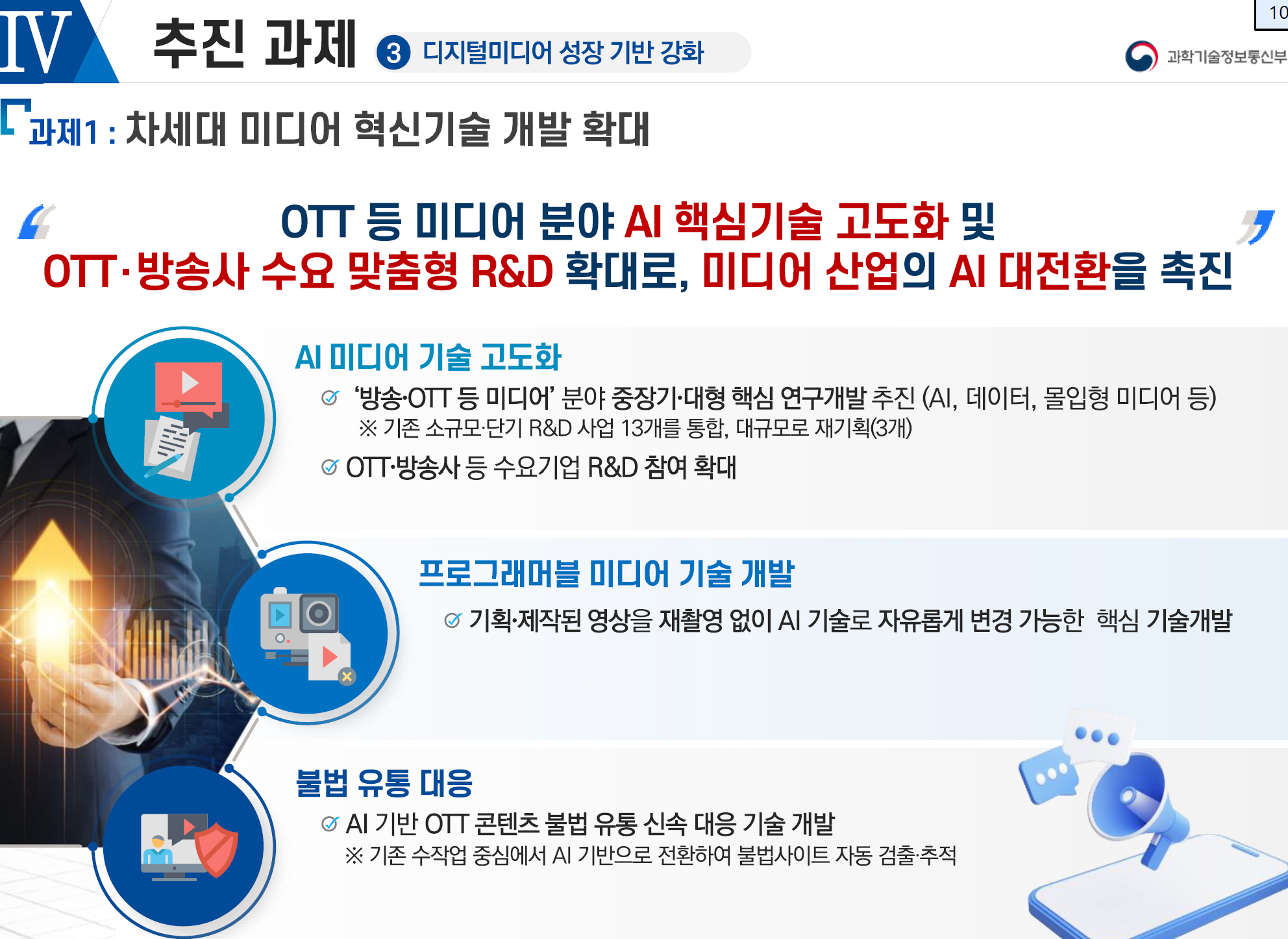
Next-Generation Media Innovation Technology Development
The initiative focuses on advancing AI-powered media technologies across three key areas to drive digital transformation in the media industry:
AI Media Technology Enhancement
- Development of core AI technologies for broadcasting and OTT platforms, including AI, data, and real-time media solutions
- Expansion of R&D participation for major broadcasters and OTT companies
- Integration of 13 existing core technology R&D projects, primarily focusing on 3rd generation development
Programmable Media Technology
- Creation of advanced AI technologies enabling automatic content transformation without original footage recreation
- Development of flexible content modification capabilities using AI-driven solutions
Content Protection Systems
- Implementation of AI-based OTT content protection and illegal distribution detection technologies
- Transition from manual monitoring to AI-powered automated content protection systems
3. 🤝 Importance of Collaboration in the K-OTT Industry
. The necessity of collaboration is a fundamental strategy for success in the K-OTT industry.
. Partnerships play a crucial role in enhancing market positioning in a globally competitive environment.
. Emphasizing collective efforts contrasts with individual strategic frameworks previously highlighted.
. Collaboration is key to achieving sustained success and advancing industry growth.
. Understanding these strategies can help stakeholders navigate the complexities of the market effectively.
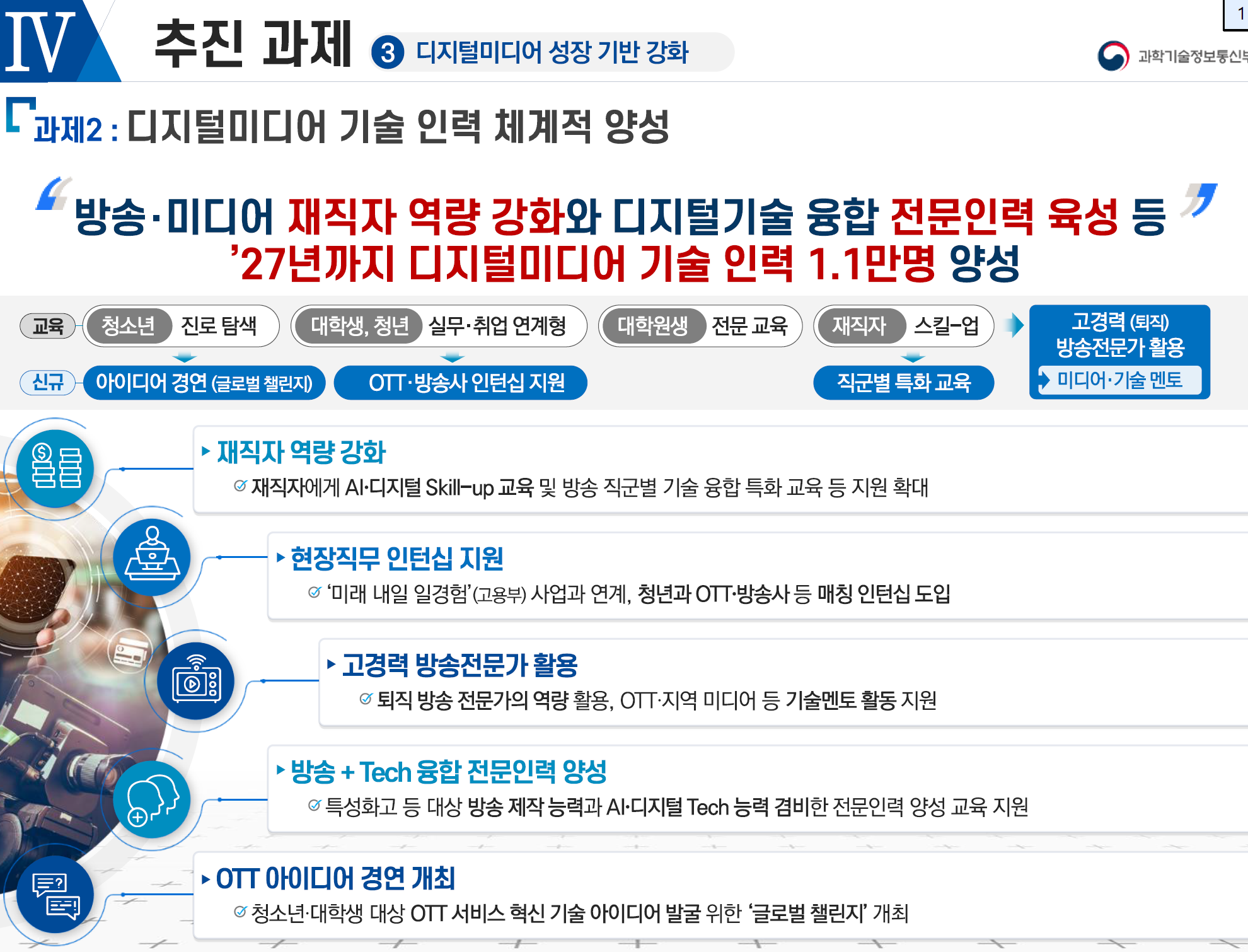
Systematic Development of Digital Media Talent Pipeline
The initiative aims to cultivate 11,000 digital media professionals by 2027 through a comprehensive talent development framework that integrates broadcasting and media expertise.
Educational Pathways
- Youth and Students: Career guidance and specialized training
- University Students: Practical industry experience and internships
- Graduate Students: Advanced professional education
- Industry Professionals: Skills enhancement programs
Key Support Programs
- AI-Digital Skill-up Training: Support for professionals to enhance broadcasting technical skills
- Current Workforce Support: Integration with "My Job Tomorrow" project linking youth with OTT and broadcasting companies
- High-quality Broadcasting Expert Development: Deployment of experienced professionals and mentoring in OTT media sectors
- Broadcasting + Tech Integration: Support for specialized training combining broadcasting expertise with AI-digital technology
- OTT Industry Career Development: Global challenge program for students and young professionals in OTT services
4. 🔍 Key Highlights from K-OTT Industry Strategies
. Explore insights to boost global competitiveness in the K-OTT sector.
. Achieving growth through an annual rate of 8% to 20% is pivotal.
. Emphasizes the need for collaboration to enhance sustainability .
. Understanding these frameworks aids in navigating market complexities.
. Engagement equips stakeholders to contribute to industry advancements.
5. 📈 Strategies for Stakeholder Engagement in K-OTT Industry
. To engage effectively in the K-OTT industry, stakeholders must understand their roles and responsibilities clearly.
. Strategies should include actionable steps that build on previous sustainability discussions, leading to practical applications.
. Emphasizing collaboration and innovation is crucial to enhancing the industry's global competitiveness and sustainability .
. Stakeholders should focus on contributing to industry advancements through these strategic frameworks.
6. 🚀 Market Challenges and Opportunities in the K-OTT Sector
. The chunk focuses on analyzing the challenges faced by the K-OTT industry.
. It highlights the opportunities available in the market for strategic engagement by stakeholders .
. Understanding both challenges and opportunities is crucial for strategic planning in the K-OTT sector.
7. 📈 Future Trends in the K-OTT Industry
. The K-OTT industry's growth rate is projected to be 8% annually, reflecting a positive trend.
. There is potential for the industry to achieve an even more significant growth rate of 20% in certain areas.
. The analysis of future trends focuses on how these projections influence strategic planning and decision-making.
. Stakeholders are encouraged to remain proactive by understanding and leveraging these trend projections.
. Exploring these trends helps stakeholders devise strategies that align with market dynamics and growth trajectories.
8. 📘 Conclusion and Future Directions for K-OTT Industry
. The document concludes by synthesizing key insights and strategies discussed for enhancing global competitiveness in the K-OTT industry.
. Emphasizing collaboration and innovation is seen as crucial for maintaining sustainability in this evolving market .
. Future directions suggest stakeholders focus on strategic frameworks to navigate market complexities effectively.
. The conclusion reinforces the importance of understanding growth metrics, such as annual rates of 8% and 20%, to drive industry advancement.
. Engaging with these insights is essential for contributing to the K-OTT sector's progress and sustainability .







![[2026엔터테크] 윤리적 AI 스튜디오 종합 보고서](https://cdn.media.bluedot.so/bluedot.kentertechhub/2026/01/ylqs2w_202601040723.png)
![[심층분석] 디즈니-OpenAI 10억 달러 딜이
K-콘텐츠 산업에 던지는 시사점](https://cdn.media.bluedot.so/bluedot.kentertechhub/2025/12/qz7dim_202512301210.jpeg)

![[CES2026]엔터테크 전문 투어&트렌드 현장 리포트(무료)](https://cdn.media.bluedot.so/bluedot.kentertechhub/2025/12/5x46lj_202512261120.png)
![[보고서]디즈니의 IP 플라이휠, 1957년 메모에서 시작된 100년 전략](https://cdn.media.bluedot.so/bluedot.kentertechhub/2025/12/vtekpo_202512140501.png)
![[리포트]글로벌 스트리밍 대전환과 FAST 시장의 부상](https://cdn.media.bluedot.so/bluedot.kentertechhub/2025/12/7jw8up_202512120304.png)
![[보고서]K-콘텐츠, 몰입형 공간 새로운 경험](https://cdn.media.bluedot.so/bluedot.kentertechhub/2025/12/je15hi_202512061434.png)

